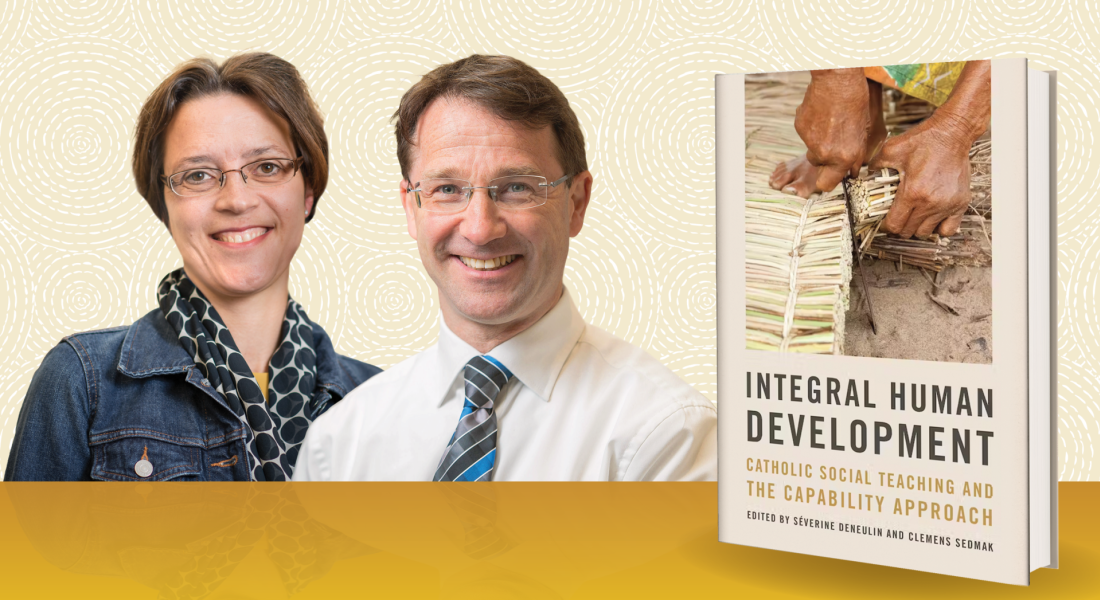
The latest book in the Kellogg Institute Series on Democracy and Development brings into conversation two major moral traditions in the social sciences and humanities that offer common areas for understanding, interpreting, and transforming the world.
Integral Human Development: Catholic Social Teaching and the Capability Approach (Notre Dame Press, 2023) is edited by former Kellogg Visiting Fellow Séverine Deneulin, director of International Development at the Laudato Si’ Research Institute and associate fellow at the Oxford Department of International Development, and Kellogg Faculty Fellow Clemens Sedmak, director of the Nanovic Institute for European Studies and professor of social ethics in the Keough School of Global Affairs at the University of Notre Dame.
The book brings together for the first time social scientists and theologians in dialogue over their respective uses of Catholic social tradition (CST) and the capability approach (CA). The contributors discuss what their mutual grounds are, where they diverge, and where common areas of collaboration and transformative action can be found. They offer a critical analysis of CA from the perspective of theology and provide an original account of CST. Integral Human Development offers a broader historical, biblical, social, economic, political, and ecological understanding of CST than that which is currently available in the CST literature.
Sedmak developed the idea for the book when he was acting director of the Ford Program for Human Development and Solidarity a few years ago. “I realized that the Ford program works at the intersection of the capability approach and Catholic Social Tradition, so I became interested in exploring these two ways of approaching values in development,” he explained.
“I organized a joint working group between the Kellogg Institute and the Center for Social Concerns on this topic. Séverine, who is an expert in both discourses, happened to be on campus for a year and we started to work on the project.”
“The capability approach with its emphasis on values and freedom can enrich the social teachings of the Catholic tradition with its emphasis on faith and community; conversely, Catholic Social Teaching can offer conceptual and analytical lenses for the capability approach,” shared Deneulin. “This volume seeks to point out the significant common ground that these two normative traditions – one secular, one faith-based – share: a commitment to an integral understanding of development, so much needed today as we face an unprecedented challenge of maintaining a functioning common home for all humanity to flourish.”
In addition to Deneulin and Sedmak, chapter contributors to Integral Human Development include former Kellogg staff members Ilaria Schnyder von Wartensee and Elizabeth Hlabse, as well as Amy Daughton, Dana Bates, Lori Keleher, Joshua Schulz, Katie Dunne, Cathriona Russell, Meghan J. Clark, Guillermo Otano Jiménez, James P. Bailey, Helmut P. Gaisbauer, and Augusto Zampini-Davies.
Integral Human Development was conceived for a heterogeneous audience, both academically and geographically. It is aimed at students, scholars, and practitioners in global affairs, development studies, or the social sciences who seek to better understand Catholic teaching and what it can offer to address the current socio-environmental challenges. It is also aimed at students and scholars in theology and religious studies, and those working in faith-based organizations, who seek to understand what the normative framework of the capability approach can contribute to the development of the social teachings of the Catholic tradition. It is intended both for those in the global North and the global South.
“I personally hope that the community of the Keough School, with its emphasis on integral human development, also will find it of interest,” offered Sedmak.
Citing Pope Francis and his words from Laudato Si’, where he proclaimed that solutions to the ecological crisis and other social issues must arise from “syntheses between faith and reason,” Deneulin said, “We hope that the book will inspire critical reflection and analysis of contemporary realities from the perspective of human dignity. Most of all, we hope that the book will enable faith-based and secular perspectives to come together on a shared journey of reconciliation with the world that is our home.”
There will be an online book launch event through the Laudato Si’ Research Institute on Tuesday, Dec. 5, at 5:00 pm Europe/London time (noon Eastern US time). For more information and to register, click here.
The Kellogg Institute for International Studies, part of the Keough School of Global Affairs at the University of Notre Dame, is an interdisciplinary community of scholars and students from across the University and around the globe that promotes research, provides educational opportunities, and builds partnerships throughout the world on the themes of global democracy and integral human development.





